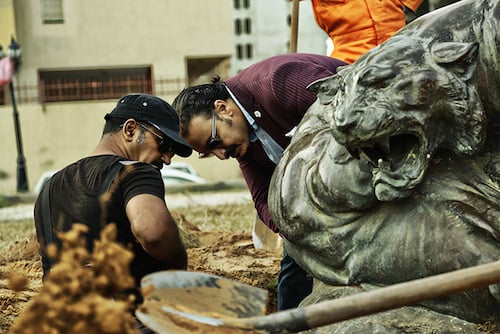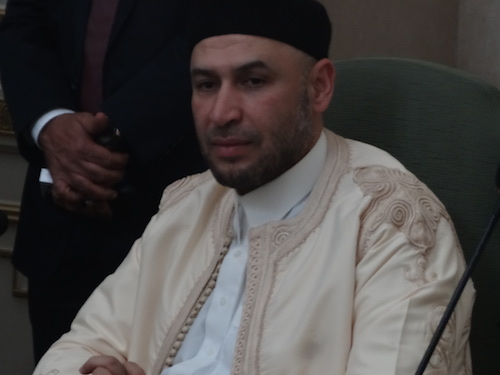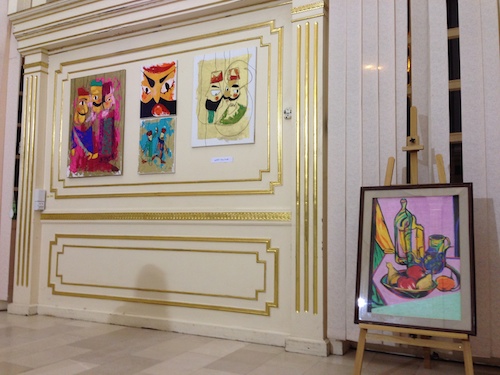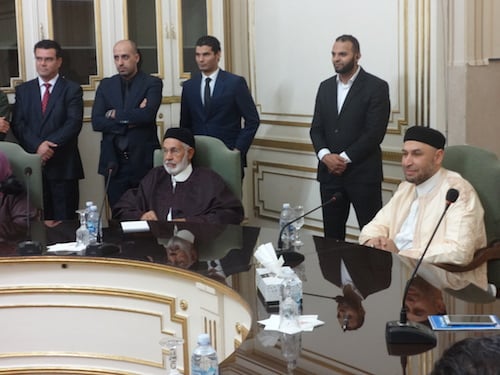By Libya Herald staff.

Tripoli, 19 December 2014:
The Mayor of Central Tripoli has pledged his support for plans to preserve the capital’s . . .[restrict]rich and diverse culture and heritage, hosting an event highlighting some of its treasures and urging the capital’s residents to get more involved.
“I ask everyone to be committed to Tripoli, and preserving Tripoli. We should all work together to help the municipality achieve its aims. We need to collaborate,” Mayor of Central Tripoli Mahdi Al-Harati said, encouraging the active involvement of the capital’s citizens. “You should not wait for the municipality to invite you to do things. Interested parties should bring their ideas and projects to us, and tell us about them.”
Harati cited as an example Wasim A. Elburawi, who approached the mayor in a cafe to ask for help. “It was at the time when attacks were happening, on mosques and the Ghazala statue and he just came up to me with this brilliant idea on ways to save history and culture in Libya.” Harati added that, because many people pictured him as a sort of ogre, he admired Elburawi’s courage.

Elburawi heads the Chrome Foundation for Culture – a Tripoli-based heritage NGO which focuses on the preservation of Libya’s culture and history. Established in 2011, it has already completed nine projects but has risen to prominence with its recent hands-on response to dealing with attacks on historic buildings and monuments, especially ancient mosques in the Old City.
Most recently, the foundation approached Harati with a formal request to remove a statue of fighting lions in Zawiyat Dahmani, after two other monuments – the Ghazala and a statue of Omar Mukhtar disappeared.
“The Mayor was very supportive and gave me all the permissions and facilities to relocate the lions for safekeeping,” Elburawi told the Libya Herald. “It is a very notable bronze work, important both to Libyans and Italians, because it was one of three pieces Italian sculptor Angiolo Vannetti made for Libya.”

Harati said that the capital needed help from its own residents and visitors, who could contribute to ensuring that the city had peace, adding: “We should be optimistic and hopeful and get rid of any negativity.”
The mayor was speaking at a seminar, hosted by the Municipality and organised by the Chrome Foundation, which brought together some of Libya’s most senior heritage officials and experts.
The event was designed to raise awareness amongst local professionals and senior officials about current threats to heritage sites, and to encourage the sharing of new discoveries and developments in the sector. Talks covered a range of Libya’s historical sites and artefacts. Dr Mustafa Al-Hewat from the Almergheb University discussed of the mosaics from Leptis Magna, while executive manager of Tripoli Museum Najat Bin Hameda provided a fascinating pictorial overview of the treasures the museum holds.

A film was also shown, featuring some of the work of the Chrome Foundation, including the removal of the statue of the fighting lions, and work on repairing damage inflicted by vandals on ancient mosques in Tripoli’s Old Town. Although too short and modest to really do justice to the achievements of the Chrome Foundation, it gave a flavour of the level of enthusiasm and commitment the NGO has brought to Tripoli’s heritage scene.
“There is much more work we still need to do, especially with our libraries which are in bad condition and kept in unsuitable storage conditions,” Elburawi said. “Our old buildings have also been neglected and face many problems, such as water ingress and rising damp.” His rousing speech, culminating in a description of the rescue mission of the fighting lions statue last month, was greeted with a thunderous round of applause.

Other features of the event included a presentation by the Mayor of a special commendation to a representative from the Italian embassy to honour an Italian historian and scientist Mario Luni, who spent almost 30 years of his life working in Libya. Local art was also exhibited in an adjacent room, featuring Tripoli-based photographer Aimen Al-Shataani and artist Njlaa El-Shaftary.
Retired former assistant to the Ministry of Foreign Affairs and International Cooperation Mohamed Taher Siala described the seminar as a helpful and valuable move towards establishing programmes to protect cultural heritage.
“To move forward, people have to understand and listen to each other in order to safeguard the country’s culture for future generations,” he said, adding that he had been very impressed by the enthusiastic response from participants and audience alike.









